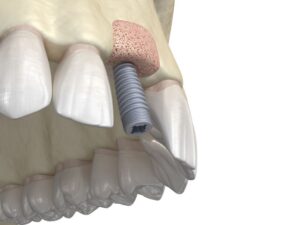
Dental implant treatment is a complex process; its success often depends on procedures that prepare the mouth to support dental implants and their restorations. One such procedure is bone grafting, which fortifies and enlarges the jawbone so it can be a sturdy base for dental implants. If your oral surgeon has informed you that you need a bone graft, it is understandable if you are a little nervous about the road ahead — but there is no need to be worried. In this blog post, you will learn what you can expect throughout your recovery period.
Expect Swelling and Bruising
Some bruising and swelling are normal after a dental bone graft. A cold compress can help to minimize such issues. Be sure not to apply ice for more than 20 or 30 minutes at a time. The swelling usually goes away within a week or two.
Be Careful about What You Eat
It is generally best to adhere to a liquid diet for 24 hours after a bone graft. Things like smoothies, applesauce, broth, and meal replacement shakes are all acceptable choices. When you return to eating solid foods, be very careful around your surgical site.
If you experience a slightly grainy sensation under your gums when you are chewing, that might be because some of the grafted material has become dislodged. This is common and usually not a cause for concern. Most of the graft should stay exactly where it belongs.
Do Not Smoke
Smoking can slow down your body’s natural healing processes and heighten your risk of post-op infection. Therefore, you should avoid cigarettes and similar products while you are recovering. It would also be wise to avoid nicotine patches if possible.
Call Your Oral Surgeon with Questions
If you strictly follow the post-op instructions from your surgical team, it is unlikely that you will encounter any complications after your procedure. However, you should still feel free to contact your care team if you notice any strange or unusual symptoms. The sooner you get such issues addressed, the easier they may be to treat.
Be Patient
The overall timeline for recovering from a dental bone graft varies from patient to patient. It depends largely on your overall health and the specific type of bone graft you receive. For example, a block bone graft (which uses a solid chunk of bone material to enlarge the jaw) may require a longer recovery time than a particulate graft (which uses grainy, bone material).
Most people find that the soft tissue at their surgical site is healed within just a few weeks. The underlying bone may take several months to completely recover, but you should notice little to no discomfort after the soft tissues are fully mended.
Bone grafting can be an important part of dental implant treatment. Knowing what to expect from this procedure can help you move forward with confidence.
Meet the Practice
Drs. Steve Koo and William Shepard are the talented oral surgeons in our practice. They use a combination of experience, education, skill, and technology to perform a range of complex procedures, including dental bone grafting and dental implant placement. If you have questions about these services, our team would be pleased to speak with you. Contact our Katy/Cypress office at 832-353-1100.

